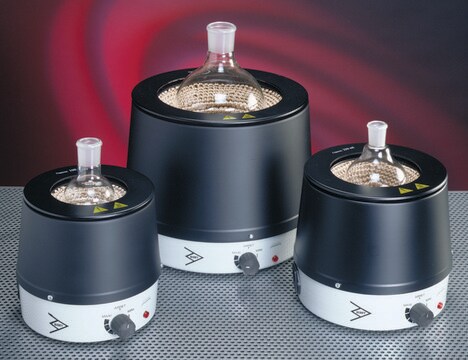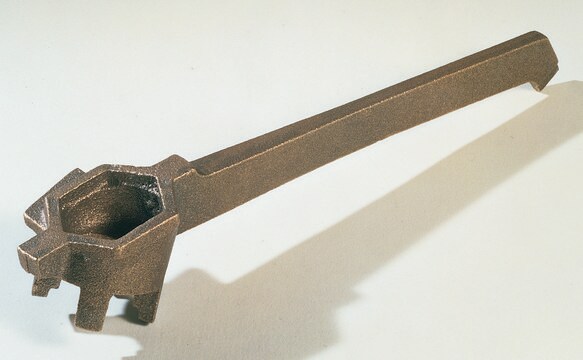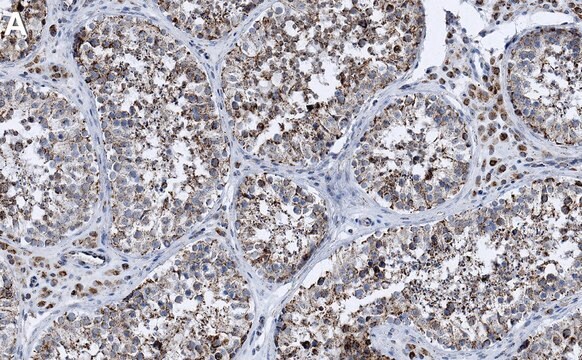17-10388
Di-Ubiquitin (Lys63-linked) Recombinant Protein
Native K63 linked Di-Ubiquitin which can be used as a substrate for proteases that cleave the isopeptide linkage between two ubiquitin molecules.
Sign Into View Organizational & Contract Pricing
All Photos(3)
About This Item
UNSPSC Code:
12352200
eCl@ss:
32160405
NACRES:
NA.52
Recommended Products
Quality Level
Assay
>95% (reversed phase HPLC)
mol wt
Mw ~17 kDa
manufacturer/tradename
Chemicon®
shipped in
dry ice
General description
ANTIBODY AVAILABLE!
Anti-Ubiquitin, Lys63-Specific, clone Apu3 (catalogue # 05-1308)
This product is a native K63 linked Di-Ubiquitin which can be used as a substrate for proteases that cleave the isopeptide linkage between two ubiquitin molecules. It can also be used to investigate mechanism of binding and recognition by proteins that contain ubiquitin-associated domains or ubiquitin-interacting motifs (UIMs).
This product is formed by chemical ligation.
Anti-Ubiquitin, Lys63-Specific, clone Apu3 (catalogue # 05-1308)
This product is a native K63 linked Di-Ubiquitin which can be used as a substrate for proteases that cleave the isopeptide linkage between two ubiquitin molecules. It can also be used to investigate mechanism of binding and recognition by proteins that contain ubiquitin-associated domains or ubiquitin-interacting motifs (UIMs).
This product is formed by chemical ligation.
Polyubiquitin chains linked through the Lys48 residue of ubiquitin are most commonly associated with proteins targeted for proteosomal degradation.
In contrast, polyubiquitin chains linked through the Lys63 residue of ubiquitin (Ub) are associated with nonproteolytic functions such as signal transduction. Lys63-linked polyUb chains connect components of NFκB signaling in a highly regulated manner, and genetic evidence indicates the involvement of Lys63-linked Ub chains in stress response and DNA repair. Research in yeast has suggested Lys63-linked Ub chains stimulate endocytosis.
In contrast, polyubiquitin chains linked through the Lys63 residue of ubiquitin (Ub) are associated with nonproteolytic functions such as signal transduction. Lys63-linked polyUb chains connect components of NFκB signaling in a highly regulated manner, and genetic evidence indicates the involvement of Lys63-linked Ub chains in stress response and DNA repair. Research in yeast has suggested Lys63-linked Ub chains stimulate endocytosis.
Application
LC-MS Analysis
Mobile phase A = 1% CH3CN, 0.1% formic acid in water (MilliQ) and B = 1% water (milliQ) and 0.1% formic acid in
CH3CN. Phenomenex Kinetex C18, (2.1×50 mm, 2.6 μM); flow rate = 0.6 mL/min, runtime = 6 min, column T = 40°C.
Gradient: 5% to 95% B over 3.5 min. (See Figure 2)
Mobile phase A = 1% CH3CN, 0.1% formic acid in water (MilliQ) and B = 1% water (milliQ) and 0.1% formic acid in
CH3CN. Phenomenex Kinetex C18, (2.1×50 mm, 2.6 μM); flow rate = 0.6 mL/min, runtime = 6 min, column T = 40°C.
Gradient: 5% to 95% B over 3.5 min. (See Figure 2)
Components
50 µg of Di-Ubiquitin (Lys63-linked) reconstituted in 2.5 µL DMSO and 56 µL of 0.02 M TRIS, 0.25 M NaCl, pH 7.5 to a final concentration of 50 µM.
Quality
Western Blot Analysis:
0.5-2 μg/mL of anti-Ubiquitin, Lys63-Specific, clone Apu2 (Cat. # 05-1308) detected Lys63-linked Ubiquitin from 1 µg of Di-Ubiquitin (Lys63-linked) Recombinant Protein (Cat. # 17-10388). (See Figure 1)
0.5-2 μg/mL of anti-Ubiquitin, Lys63-Specific, clone Apu2 (Cat. # 05-1308) detected Lys63-linked Ubiquitin from 1 µg of Di-Ubiquitin (Lys63-linked) Recombinant Protein (Cat. # 17-10388). (See Figure 1)
Storage and Stability
Store at -80°C. Avoid freeze/thaw cycles.
Legal Information
CHEMICON is a registered trademark of Merck KGaA, Darmstadt, Germany
Disclaimer
Unless otherwise stated in our catalog or other company documentation accompanying the product(s), our products are intended for research use only and are not to be used for any other purpose, which includes but is not limited to, unauthorized commercial uses, in vitro diagnostic uses, ex vivo or in vivo therapeutic uses or any type of consumption or application to humans or animals.
Storage Class Code
10 - Combustible liquids
WGK
WGK 1
Flash Point(F)
188.6 °F - (refers to pure substance)
Flash Point(C)
87 °C - (refers to pure substance)
Certificates of Analysis (COA)
Search for Certificates of Analysis (COA) by entering the products Lot/Batch Number. Lot and Batch Numbers can be found on a product’s label following the words ‘Lot’ or ‘Batch’.
Already Own This Product?
Find documentation for the products that you have recently purchased in the Document Library.
Our team of scientists has experience in all areas of research including Life Science, Material Science, Chemical Synthesis, Chromatography, Analytical and many others.
Contact Technical Service




